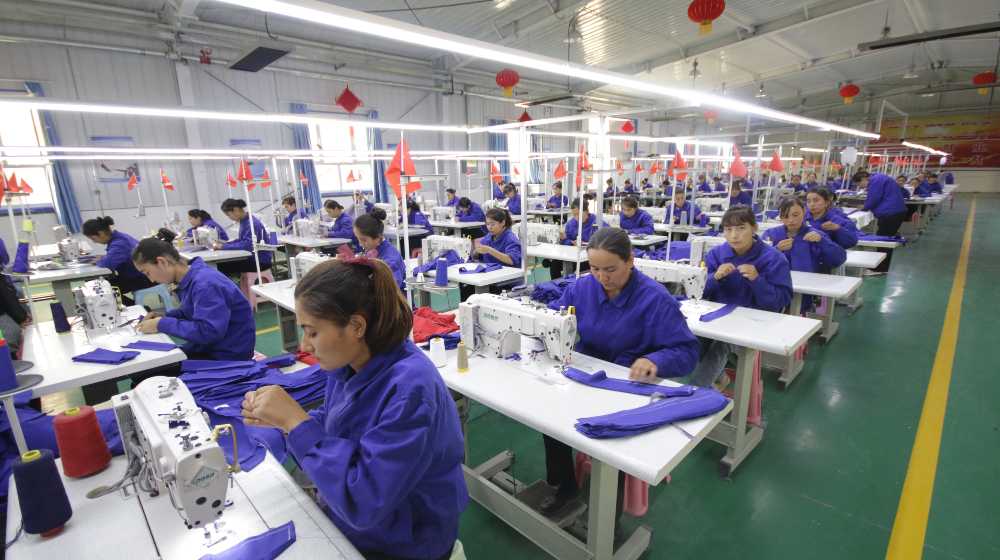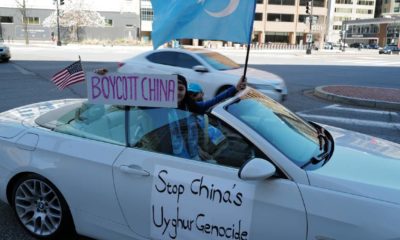Economy
US Blocks Import of Goods Made From Slave Labor

The officials detained the goods because of “reasonable suspicion” that the origin of the goods was China’s Xinjiang region. This is an area in China where more than 1 million Uyghurs are held in camps and undergo forced labor.
RELATED: US Bans China Solar Panel Imports With Forced Labor Ties
Customs Now Screening Goods Made From Slave Labor
As recently as a year ago, these goods would have breezed through customs on the way to US retail stores. However, customs officials are now actively screening and detaining hundreds of millions of dollars worth of goods suspected to originate from slave labor. These include palm oil, tomatoes, rubber gloves, clothes, and hair extensions.
At the forefront of the watchlist is Chinese cotton. Three-quarters of the seized import shipments this year contain cotton products from Xinjiang.
The province produces 20% of the total world’s supply, However, reports say that businesses use Muslim Uyghurs as slave labor in harvesting the cotton.
US Has Anti-Slave Labor Laws Since 1930
The United States has had anti-slave labor laws since 1930. However, authorities seem to have had trouble enforcing the law for over 85 years because of trade law loopholes.
In fact, US customs only managed to enforce anti-slave labor twice in the 1950s and about 30 times in the 1990s. Most enforcements involved Chinese imports that used slave labor provided by Chinese prisoners.
Until 2016, importers invoked a trade loophole that allows the shipment of slave labor goods when domestic production fails to meet demand. That year, the government closed the loophole and began enforcing the law.
This year, Customs and Border Protection were especially active in screening for slave labor goods. As of August, the agency detained at least 967 shipments worth more than $367 million.
Note that the detention of goods does not imply the importing company is aware of the slave labor used in the manufacturing process.
Scott Nova, executive director of the Worker Rights Consortium, hails the increased vigilance. “That change is extremely significant. Brands have effectively never had to think about legal liability in the context of the labor practices of their overseas suppliers. [This] forces them to do so,” he noted.
25 Million People Worldwide Working Under Slave Labor Conditions
The United Nations estimates that around 25 million people worldwide are forced into labor. This may take the form of withheld wages, confiscated passports, physical violence, and imprisonment.
Increased enforcement by the US, the world’s largest importer of goods, can spark a change. Companies will more likely change suppliers when faced with the risk of countries refusing their goods.
Ana. Hinojosa, executive director of CBP’s trade remedy directorate, oversees slave labor activities for the agency. “The impact is growing. As we've been taking more and more action, people realize that we're serious about this and that we're going to continue our investigating and continue taking enforcement actions as appropriate.”
Withhold Release Order
When the CBP has reasonable suspicion that an incoming shipment originated from slave labor sources, the agency can issue a Withhold Release Order.
For example, CBP already banned imports from Top Glove, the world’s leading manufacturer of disposable gloves. It also barred two of the largest palm oil companies in the world.
As a result of the ban, Top Glove said they have resolved all slave labor issues raised by the CBP. They said they already submitted evidence of compliance for the CBP’s review.
A Top Glove spokesperson said the company “remains committed to [improving] its workers' welfare” and will help ensure their continued happiness and well-being.
Meanwhile, palm oil producer Sime Darby Plantation said that it will commit to fighting forced labor within its supply chain. Sime Darby said that they hired contractors to examine its practices.
“SDP remains committed to completing this important work and to ensure our workers have safe working and living conditions,” it said.
Watch the National Press Foundation’s special report on Enforcing US Trade Laws: Xinjiang cotton, Uyghur slave labor, counterfeit PPE, and other contraband:
Do you agree with the renewed efforts of the Customs and Border Protection to ban imports of goods made from suspected slave labor?
In addition, will you support this initiative even if it means higher prices? Tell us what you think by sharing your comments below.





